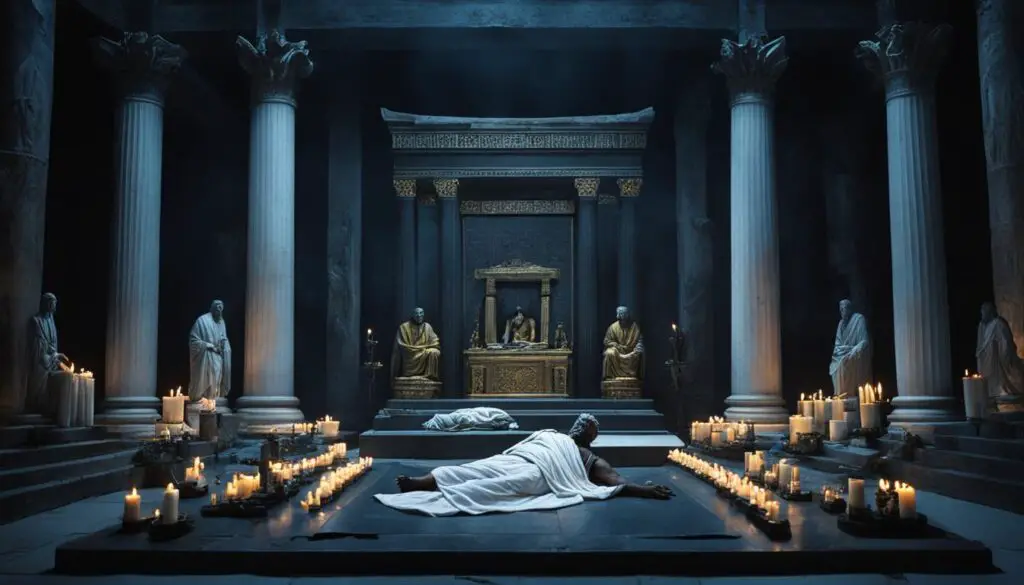Zeus, the king of the gods in Greek mythology, had a fascinating fate that is explained through various myths and legends.
In this article, we will explore the different stories surrounding Zeus’ death and unravel the ultimate fate of this powerful deity.
Many wonder, how did Zeus die in Greek mythology? What is the truth behind Zeus’ death in Greek myth?
Let’s delve into the captivating world of Zeus’ fate.
Key Takeaways:
- Zeus, the king of the gods in Greek mythology, had a unique and intriguing fate.
- There are various accounts and myths surrounding Zeus’ death in Greek mythology.
- Zeus’ stories and legends continue to captivate and inspire people today.
- Exploring Zeus’ fate sheds light on the complex world of Greek mythology.
- Zeus’ legacy remains influential and significant in ancient Greek religion and culture.
Zeus’ Birth and Childhood
Zeus, the powerful king of the gods in Greek mythology, had a remarkable birth and childhood filled with both fear and cunning. He was the son of Cronus and Rhea, two Titans who ruled over the cosmos.
However, Cronus, driven by his fear of being overthrown by his own children, devoured each of his offspring shortly after their birth. This included Hera, Hades, Poseidon, and Demeter, who were all swallowed whole by Cronus.
But Rhea, Zeus’ mother, was determined to save her child from this terrible fate. When Zeus was born, she knew she had to outsmart Cronus to keep him alive. With her quick thinking, she presented Cronus with a stone wrapped in swaddling clothes, tricking him into thinking it was their newborn son.
In this way, Zeus narrowly escaped his father’s jaws and was hidden away on Mt. Dikte in Crete, where he was raised in secret. Gaia, the Earth, along with the nymphs, attended to Zeus’ needs and nurtured him during his early years. This protected him from Cronus’ wrath and allowed him to grow into the mighty deity he would become.
Zeus’ birth and childhood marked the beginning of his extraordinary journey. While he had to overcome great peril from his own father, the cunning of Rhea and the guardianship of Gaia ensured that Zeus would grow stronger and eventually challenge the reign of Cronus.
Zeus’ Rise to Power
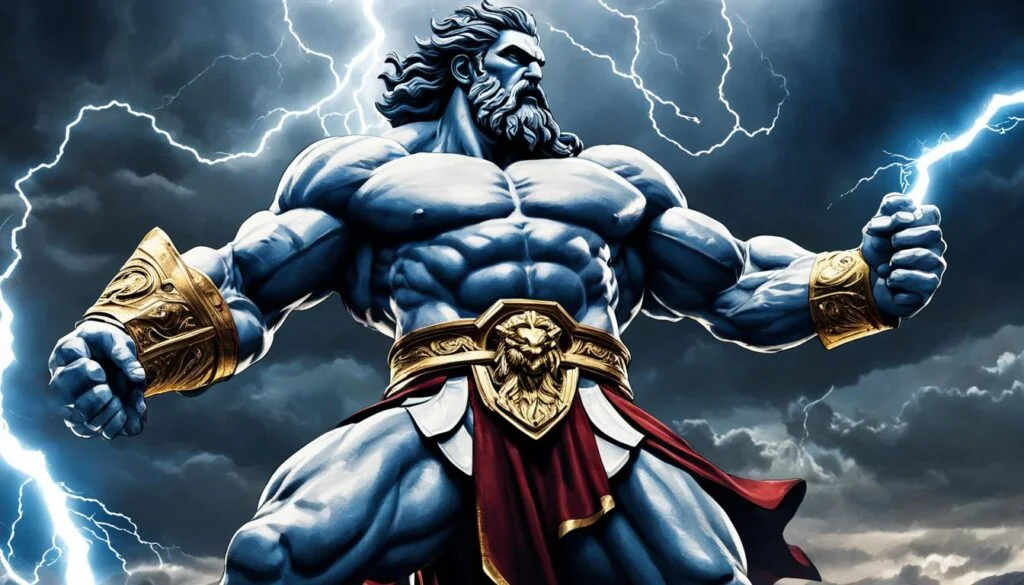
As Zeus reached adulthood, he embarked on a journey to challenge his father Cronus and the Titans in an epic battle known as the Titanomachy. This fierce conflict unfolded between the younger generation of gods, led by Zeus, and the ruling Titans, who sought to maintain their control and power.
With the aid of the mighty Cyclopes and the Hecatoncheires, Zeus rallied his siblings and waged a monumental war against the Titans. Their combined strength and strategic prowess proved superior, resulting in Zeus and his allies emerging victorious.
As a result of their triumph, the Titans were banished to the dark depths of Tartarus, a prison reserved for the most formidable adversaries. Zeus’ victory over the Titans marked a significant turning point in Greek mythology and solidified his position as the supreme ruler of the gods.
However, Zeus’ rise to power did not end with the Titanomachy. He faced another formidable challenge in the form of the Giants in the Gigantomachy.
Continuing his campaign for absolute control, Zeus confronted the Giants in a battle of epic proportions. This time, he enlisted the help of the mythological hero Hercules, renowned for his exceptional strength and bravery.
The clash between Zeus, Hercules, and the mighty Giants tested the gods’ power and determination. Yet, once again, Zeus emerged triumphant, defeating the Giants and securing his reign as the supreme deity of Mount Olympus.
The Titanomachy and the Gigantomachy symbolize Zeus’ indomitable spirit, unwavering resolve, and his relentless pursuit of power and order. These defining battles showcased his ability to overcome formidable challenges, establish divine authority, and shape the destiny of the Greek pantheon.
Zeus’ Romantic Escapades
Zeus, the king of the gods, had a notorious reputation for his numerous love affairs and extramarital relationships. His insatiable desire and charm attracted many mortal women and goddesses, resulting in a long list of lovers and numerous offspring.
Among Zeus’ many lovers were mortal women such as Alcmene, the mother of Hercules, and Danae, the mother of Perseus. He also had affairs with goddesses like Demeter, Leto, and Maia. As a result of these dalliances, Zeus fathered many famous demigods and gods.
- Hercules, the legendary hero known for his exceptional strength and bravery.
- Perseus, who slew the Gorgon Medusa and rescued Princess Andromeda.
- Persephone, the Queen of the Underworld and daughter of Demeter.
- Apollo, the god of light, music, and prophecy.
- Artemis, the goddess of the hunt and the moon.
The most famous of Zeus’ love interests was his wife Hera. However, their relationship was far from harmonious due to Zeus’ constant philandering. Hera became jealous and vengeful, often retaliating against Zeus’ lovers and their children. The turbulent relationship between Zeus and Hera was a constant source of conflict and drama in Greek mythology.
Despite his complicated love life, Zeus’ romantic escapades formed an integral part of Greek mythology, shaping the lineage of gods and heroes that have captivated generations.
Zeus as a Punisher and Peacemaker
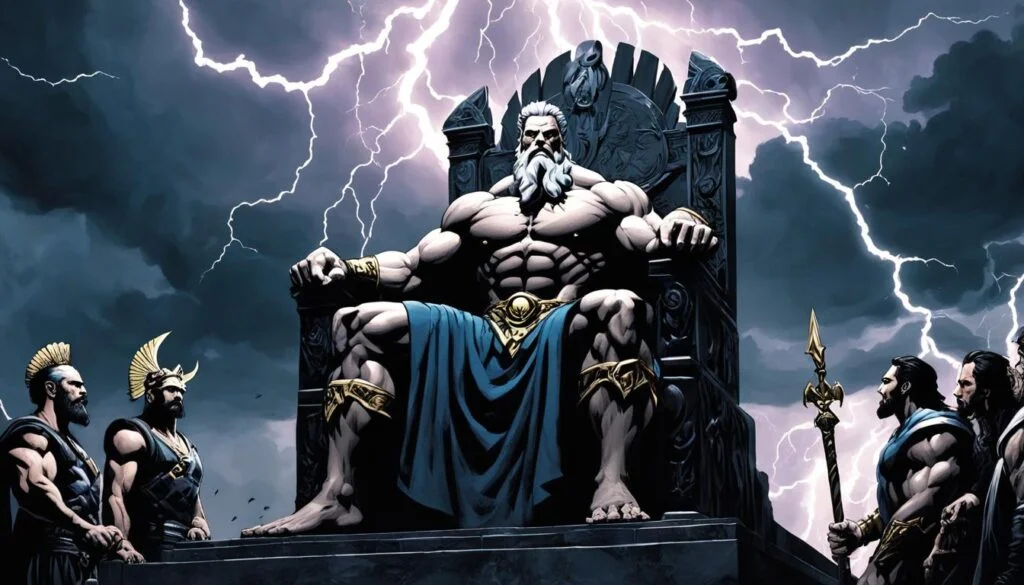
Zeus, the mighty ruler of the gods in Greek mythology, displayed his commanding power not only through his role as king but also as a dispenser of justice. Known for his unwavering sense of justice, Zeus ensured order and punished those who committed acts of impiety or wrongdoings.
One of the most well-known punishments by Zeus was inflicted upon Prometheus, the Titan who stole fire and gave it to humanity. As a consequence, Zeus ordered Prometheus to be chained to a rock, where an eagle would come and eat his liver every day, only to have it grow back again during the night. This eternal torment served as a severe warning to those who dared to defy the gods.
However, Zeus’ role as the dispenser of justice was not limited to punishments alone. He also exhibited his peacemaking abilities, intervening in conflicts among the gods and even between gods and mortals to restore harmony. Zeus acted as a mediator, finding resolutions to disputes and ensuring that order was maintained within the realm of the divine and the mortal world.
By balancing his role as a punisher and a peacemaker, Zeus embodied the complexities of divine justice. His actions underscored the importance of upholding laws and maintaining order, while also emphasizing the need for reconciliation and harmony.
In summary, Zeus’ reputation as a punisher and peacemaker in Greek mythology solidifies his position as a formidable and influential figure. His punishments served as cautionary tales, while his peacemaking efforts brought harmony to the gods and mortals alike. Zeus’ dual roles showcased both his immense power and his ability to restore order, leaving a lasting impact on Greek mythology.
Zeus in Art and Worship
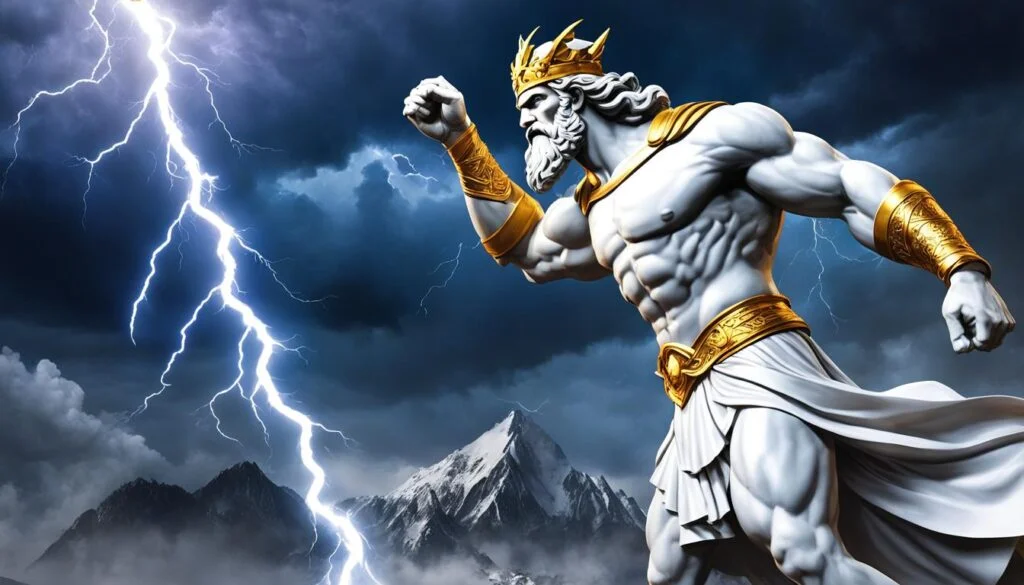
Zeus, the king of the gods in Greek mythology, was not only revered through worship but also immortalized in art. Artists often depicted Zeus as a mature, bearded man, exuding power and command. In these artistic representations, Zeus is commonly shown wielding a lightning bolt or a sceptre, symbolizing his authority and divine dominion over the heavens.
Zeus’ representation in art extended beyond physical attributes. He was closely associated with various symbols, such as the majestic eagle, the mighty bull, and the sturdy oak tree. These symbols reflected Zeus’ characteristics and powers, emphasizing his role as the ruler of the sky, the earth, and all natural forces.
Zeus’ influence was not limited to the visual realm. Throughout Greece, numerous temples and sanctuaries were dedicated to his worship. These sacred spaces served as centers of devotion and reverence, where worshippers could express their piety and seek the favor and protection of Zeus.
One of the most renowned temples dedicated to Zeus was the Temple of Zeus in Olympia. This grand structure, built around the 5th century BCE, was an architectural marvel and served as a testament to the power and importance of the deity. The ancient Olympic Games, held every four years, were dedicated to Zeus and took place within the vicinity of this temple, making it an integral part of Greek cultural and sporting history.
The Temples and Statues of Zeus
The worship of Zeus extended far and wide, with numerous temples and statues dedicated to his glory. These magnificent structures were not only religious spaces but also awe-inspiring tributes to his greatness.
- The Temple of Zeus in Athens, located on the Acropolis, was a significant center of worship and housed a colossal statue of Zeus. Though now lost to time, this imposing statue was a popular subject for poets and artists alike.
- In Pergamon, the Great Altar of Zeus showcased intricate sculptural reliefs depicting mythical scenes and heroic deeds. This monumental structure served as a testament to the grandeur and artistic skill of the Hellenistic period.
- At Olympia, the Statue of Zeus stood as one of the Seven Wonders of the Ancient World. Created by the renowned sculptor Phidias, this colossal statue depicted Zeus seated on a throne, radiating power and majesty.
The temples and statues dedicated to Zeus not only provided a physical space for worship but also served as visual representations of his might and influence. They stood as reminders of the deity’s significance in the daily lives of the ancient Greeks and the enduring legacy of Zeus in art and worship.
Zeus’ Sacred Sites and Festivals
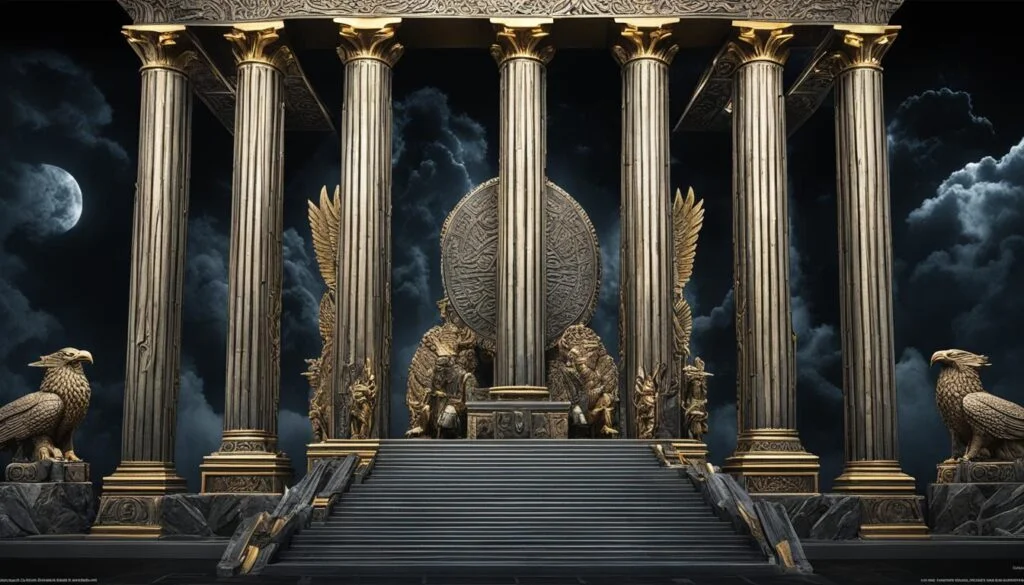
Zeus, the king of the gods in Greek mythology, held great reverence and worship at various sacred sites dedicated to him. One such sacred site was Dodona, where an oracle interpreted signs from the wind and water, guiding and enlightening those who sought Zeus’ wisdom and guidance. The oracle’s interpretations were considered divine messages from the powerful god, offering insights and predictions to the seekers.
Another important sacred site associated with Zeus was Mt. Lycaios, a mountain in Arcadia where the god was worshipped as the deity of thunder and lightning. The dramatic natural landscape of Mt. Lycaios served as a fitting backdrop for honoring Zeus’ elemental powers. It was believed that Zeus himself would manifest his divine presence amidst the rumbling thunder and flashes of lightning, instilling both awe and fear in the hearts of his worshippers.
In addition to sacred sites, festivals dedicated to Zeus were celebrated throughout ancient Greece as a testament to his supreme stature. One significant festival was the Diasia, held in Athens to pay homage to the mighty king of the gods. During this festival, the citizens would gather in joyful celebration, offering sacrifices and prayers for the prosperity and well-being of their city, as well as for Zeus’ blessings.
These sacred sites and festivals played a crucial role in the religious practices and beliefs of the ancient Greeks, solidifying Zeus’ significant influence and his central position in their culture. The reverence shown towards Zeus through these rituals and celebrations testified to his power and the importance attributed to maintaining a harmonious relationship with the ruler of the gods.
The Legacy of Zeus
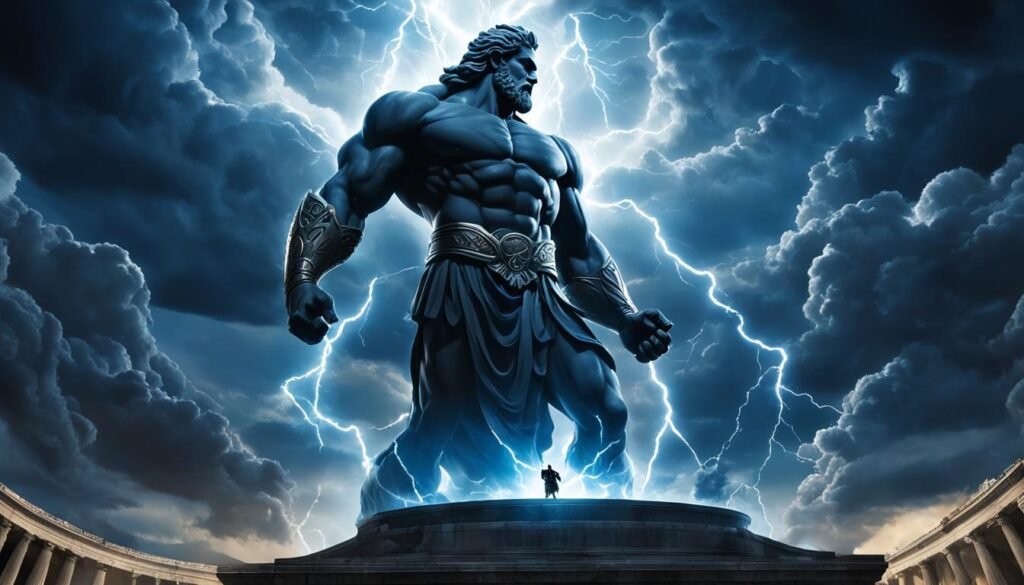
Zeus’ impact on Greek mythology and his role in the pantheon solidify his enduring legacy. As the chief deity, Zeus held immense importance and influenced the core concepts of justice, order, and divine authority within the ancient Greek culture.
Through his powerful stories, Zeus continues to captivate audiences and be revered across generations. His reign as king of the gods brought him to the forefront of Greek mythology, making him one of the most significant and well-known figures in ancient Greek religion.
Zeus’ legacy lives on in the hearts and minds of those who appreciate his divine power and intricate tales. His adventurous escapades and godly interactions have left an indelible mark on Greek mythology, ensuring his place as an iconic and central figure.
The Impact of Zeus’ Rule
- Zeus’ role as the ruler of the gods showcased the embodiment of divine authority and governance.
- His prominence in the pantheon established a hierarchy that provided structure and order to the Greek deities.
- Zeus’ wisdom and guidance influenced the values of justice, fairness, and moral conduct in Greek society.
- As the embodiment of thunder and lightning, Zeus represented the power of nature and the forces of the universe.
Zeus’ influence extended beyond mythology and shaped the belief systems of the ancient Greeks, leaving an indelible impact on their understanding of the divine and the world around them.
Conclusion
In conclusion, Zeus’ fate in Greek mythology is a captivating narrative that encompasses various aspects of his divine existence. From his dramatic birth and challenging upbringing to his legendary rise to power, Zeus’ journey is filled with tales of triumph and turmoil. As the king of the gods, Zeus played a crucial role in maintaining order and justice, employing his powers as a punisher and peacemaker. His romantic escapades and numerous offspring further contribute to the complexity of his character.
Throughout Greek mythology, Zeus’ enduring legacy remains undeniable. His representation in art, worship in temples, and celebration through festivals exemplify his ongoing significance in Greek culture. As a symbol of authority and divine power, Zeus influenced the principles of justice and order that continue to resonate even today.
Zeus’ intricate narrative, vibrant with a multitude of stories, showcases the depth and richness of Greek mythology. From his birth to his ultimate fate, Zeus reflects the complexities of human existence and serves as a reminder of the enduring power of myth and legend. As one of the most prominent figures in ancient Greek religion, Zeus’ legacy lives on, leaving an indelible mark on the realm of mythology.
FAQ
How did Zeus die in Greek mythology?
Zeus does not die in Greek mythology. He is an immortal deity and the king of the gods.
What is the story of Zeus’ birth and childhood?
Zeus was born to Cronus and Rhea. His mother saved him from being devoured by Cronus by tricking him into swallowing a stone instead. Zeus was then raised on Mt. Dikte in Crete by Gaia and the nymphs.
How did Zeus rise to power?
Zeus challenged his father Cronus and the Titans in a great battle known as the Titanomachy. With the help of the Cyclopes and the Hecatoncheires, Zeus and his siblings defeated the Titans and banished them to Tartarus. Zeus also faced the Giants in the Gigantomachy and emerged victorious.
Who were Zeus’ lovers and offspring?
Zeus had numerous love affairs and relationships. He had many offspring with mortals and goddesses, including Hercules, Perseus, Persephone, Apollo, and Artemis, among others. However, his relationship with his wife Hera was often tumultuous due to his infidelity.
What was Zeus’ role as a punisher and peacemaker?
Zeus dispensed justice and ensured order among the gods and humanity. He punished those who committed acts of impiety or wrongdoings, such as Prometheus. However, he also acted as a peacemaker, resolving conflicts among the gods and even between gods and mortals.
How was Zeus depicted in Greek art and worshiped?
Zeus was depicted as a mature, bearded man wielding a lightning bolt or a sceptre in Greek art. He was associated with symbols such as the eagle, the bull, and the oak tree. Zeus had dedicated temples and sanctuaries throughout Greece, including the famous Temple of Zeus in Olympia.
Where were Zeus’ sacred sites and what were the festivals dedicated to him?
Zeus had sacred sites dedicated to him, such as Dodona where an oracle interpreted signs from the wind and water. Another important site was Mt. Lycaios, where Zeus was worshiped as the god of thunder and lightning. Festivals in honor of Zeus, such as the Diasia in Athens, were celebrated to show reverence to the king of the gods.
What is the legacy of Zeus in Greek mythology?
Zeus’ legacy is seen through his importance in Greek mythology and his role as the chief deity in the pantheon. He influenced concepts of justice, order, and divine authority. His stories continue to be passed down through generations, cementing his place as one of the most significant figures in Greek mythology.


